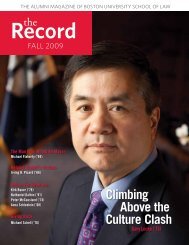the nature of representation: the cherokee right ... - Boston University
the nature of representation: the cherokee right ... - Boston University
the nature of representation: the cherokee right ... - Boston University
Create successful ePaper yourself
Turn your PDF publications into a flip-book with our unique Google optimized e-Paper software.
2005] THE NATURE OF REPRESENTATION 135<br />
provision. 225<br />
2. Cherokee Inaction and Congressional Power to Deny Delegates<br />
Though on its face Article 7 <strong>of</strong> <strong>the</strong> Treaty <strong>of</strong> New Echota does not contain an<br />
expiration date, <strong>the</strong> Cherokee Nation’s long delay in seeking to seat <strong>the</strong>ir<br />
Congressional delegate arguably allows for a claim that <strong>the</strong> <strong>right</strong> is no longer valid.<br />
Recently, <strong>the</strong> Supreme Court, in City <strong>of</strong> Sherill v. Oneida Indian Nation <strong>of</strong> New<br />
York, held that in part because <strong>of</strong> “<strong>the</strong> Oneidas’ long delay in seeking judicial<br />
relief . . . <strong>the</strong> Tribe cannot unilaterally revive its ancient sovereignty, in whole or<br />
in part.” 226 Though <strong>the</strong> Court was examining <strong>the</strong> Oneida Tribe’s ability to place<br />
reacquired land within original reservation boundaries into trust, <strong>the</strong> Court’s focus<br />
on <strong>the</strong> Oneida delay is similar to <strong>the</strong> Cherokee delay exercising <strong>the</strong>ir delegate <strong>right</strong>.<br />
“The Oneidas long ago relinquished <strong>the</strong> reins <strong>of</strong> government and cannot regain<br />
<strong>the</strong>m,” 227 and <strong>the</strong> Cherokee delegate claim might be viewed similarly.<br />
The Cherokees have not made a concerted, politically primary effort to exercise<br />
<strong>the</strong>ir delegate <strong>right</strong>. Part <strong>of</strong> this can be explained by observing that throughout this<br />
170-year history <strong>the</strong> Cherokees have been subject to U.S. policies and politics that<br />
made it difficult for <strong>the</strong> Cherokee Nation to actively pursue all <strong>the</strong> Nation’s <strong>right</strong>s.<br />
Even in a hostile environment that makes tribal leadership a challenge, Cherokee<br />
inaction on as powerful a <strong>right</strong> as that to a Congressional delegate is remarkable.<br />
Although a prolific writer, John Ross never discussed seating a Cherokee delegate<br />
in his writings. 228 Lewis Downing urged Ross to work on <strong>the</strong> delegate <strong>right</strong>, but<br />
did so late in Ross’s life, and nearly 29 years after <strong>the</strong> Treaty <strong>of</strong> New Echota:<br />
In my opinion <strong>the</strong> time has come when it is proper, and highly desirable, that<br />
<strong>the</strong> Government <strong>of</strong> <strong>the</strong> U.S. make immediate provision for carrying into effect<br />
<strong>the</strong> 7th Article <strong>of</strong> Treaty <strong>of</strong> 1835 by allowing us a Delegation to Congress <strong>of</strong><br />
our own choice, To be paid by <strong>the</strong> Government, in <strong>the</strong> same manner, and at<br />
<strong>the</strong> same rate as delegates from <strong>the</strong> organized Territories. 229<br />
Lewis Downing’s call for action did not lead to <strong>the</strong> protracted Cherokee national<br />
efforts merited by <strong>the</strong> potential significance <strong>of</strong> <strong>the</strong> delegate <strong>right</strong>.<br />
225<br />
Chadwick Smith & Faye Teague, The Response <strong>of</strong> <strong>the</strong> Cherokee Nation to <strong>the</strong><br />
Cherokee Outlet Centennial Celebration: A Legal and Historical Analysis, 29TULSA<br />
L.J. 263, 275 (1993) (“Article 31 <strong>of</strong> <strong>the</strong> treaty reaffirmed all previous treaties not<br />
inconsistent with <strong>the</strong> 1866 treaty. Therefore, <strong>the</strong> provisions and covenants <strong>of</strong> <strong>the</strong><br />
treaties<strong>of</strong> 1828, 1833, 1835, and 1846, were all reaffirmedand continued as binding on<br />
<strong>the</strong> Cherokee Nation and <strong>the</strong> federal government.”).<br />
226<br />
125 S. Ct. 1478, 1483 (2005).<br />
227<br />
Id.<br />
228<br />
THE PAPERS OF CHIEF JOHN ROSS, supra note 14.<br />
229<br />
Letter from Lewis Downing to John Ross and Evan Jones (Oct. 18, 1864), in 2<br />
THE PAPERS OF CHIEF JOHN ROSS, supra note 14, at 614.









